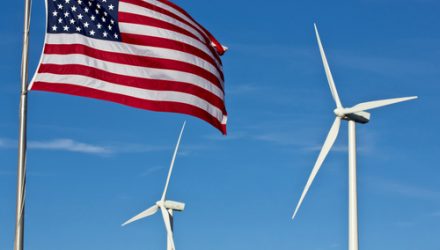The ALPS Clean Energy ETF (ACES) outpaced weak U.S. equities last week on strong earnings from clean energy companies despite a challenging macroeconomic backdrop.
With the Federal Reserve boosting interest rates another 75 basis points last week to the range of 3.75%–4%, investor fears of a 2023 recession were slightly eased by a stronger-than-expected U.S. jobs report for October last Friday, ALPS wrote in an insight on November 7.
Heading into the winter season, inventories of U.S. crude oil, gasoline, and natural gas are depleted, lifting clean power generation stocks. Investors bid up the clean power generation — solar, wind, and hydro/geothermal — segments in ACES last week on a strong runway of growth for those companies as the global energy transition to net-zero emissions gained momentum, according to ALPS.
“With Europe, the US, China and the rest of the world materially funding energy transition initiatives to become energy independent from a national security perspective as fossil fuel prices rise, battery storage capacity is what will expedite the mass global adoption of wind, solar, hydro/geothermal, and fuel cell (hydrogen),” ALPS wrote.
ACES offers roughly a 5% weight to energy storage companies within the U.S. and Canada, providing investors with a diversified approach to investing in the fastest-growing aspects of clean energy. ACES’ pure-play methodology offers exposure to only U.S. and Canadian companies across seven distinct clean energy segments.
As costs come down, global battery storage additions are expected to grow at a 21% compound annual rate through 2030, according to BloombergNEF.
BloombergNEF also estimated that the Inflation Reduction Act, which was passed in August and offers $260 billion in U.S. clean energy policy support, has led to an impressive 24% increase in U.S. energy storage forecasts. This increase has manifested both in attachments to clean energy projects and as stand-alone solutions to storing and delivering clean power from the U.S. electricity grid.
The upfront cost of batteries is still a major factor for project return on investment despite the fact that adding battery storage to a project can allow customers to potentially detach from the grid and/or sell more clean power back to the local utility, according to ALPS.
The Inflation Reduction Act provides a 30% tax credit on clean power storage, including and beyond solar, expanding the U.S.’s capacity to store and deliver clean power at all times of the day, according to ALPS.
Other ETFs that offer exposure to the clean energy industry include the First Trust NASDAQ Clean Edge Green Energy Index Fund (QCLN) and the SPDR S&P Kensho Clean Power ETF (CNRG).
For more news, information, and strategy, visit the ETF Building Blocks Channel.








